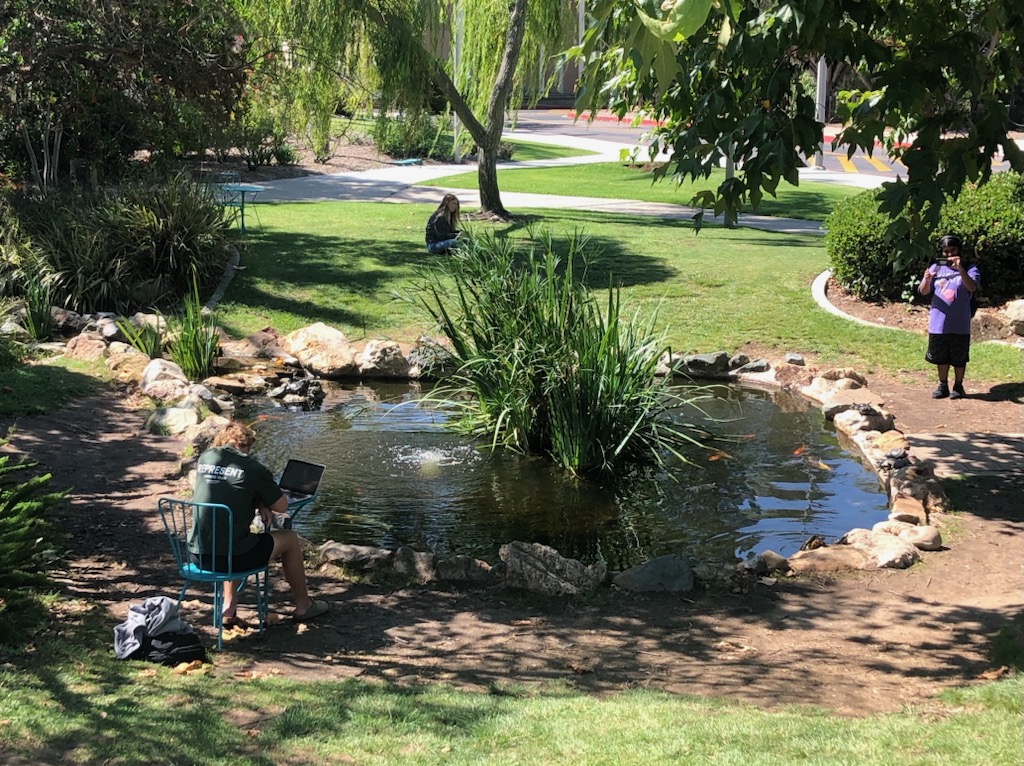
Students spend time at the turtle pond on the campus of San Diego State University.
Credit: Noah Lyons/EdSource
According to a 2018 study published by Frontiers of Public Health, spending time outdoors can aid people in a variety of categories: “attention and cognition, memory, stress and anxiety, sleep, emotional stability and self-perceived welfare or quality of life.”
Monicka Fosnocht, an associate therapist at San Diego State University with a background in natural public medicine agrees. “For a lot of students that are struggling with mental health, or even students who don’t and are just stressed, it’s really helpful to get a nice, big dose of vitamin D and get outside so that we can get our brains functioning optimally.”
SDSU has its own outdoor resources. One space in particular, the turtle pond, has become a popular destination for students seeking solace from their academic lives.
The origins of the turtle pond date back to 1973. The campus community asked for more green spaces, and the school delivered. Koi fish dominated the scene at first, but red-eared slider turtles eventually became the pond’s informal namesake.
 Within this area, there are hammocks, slacklines, trees, ample seating and, of course, the pond itself, all providing students with a mental health boost.
Within this area, there are hammocks, slacklines, trees, ample seating and, of course, the pond itself, all providing students with a mental health boost.
The therapeutic effect of being in outdoor spaces is increasingly being noted by mental health professionals, including SDSU counseling and psychological services faculty member Tri Nguyễn.
“Therapists are moving a lot more outdoors.” Nguyễn said. “There are providers who do therapy outdoors, by hiking or going on a walk. It’s no longer just within the confines of an office space.”
While individuals between 15 and 21 years old are significantly more stressed than older generations, they are more likely to report their struggles and seek help. Fosnocht is optimistic that young people can normalize conversations surrounding mental health and find unique ways to address it.
“I’m really hopeful for Gen Z and the generations to come that are decreasing the stigma around mental health and also connecting it to very accessible things like being in nature, hanging out with the turtles, talking to other people and taking the time to connect with people in person.”
A frequent turtle pond visitor is Natale Canepa, a fifth-year journalism and media studies major. While he isn’t a musician by nature, he’s added to the character of the turtle pond with his music. He said that to express his excitement about returning to classes after the pandemic, he started whistling.
Nicknamed “The Turtle Pond Whistler,” Canepa posts videos on Instagram, which has, in turn, attracted others to the turtle pond.
In addition to being an outlet for his self-expression, he views the pond as a place for truly living in the moment.
https://www.youtube.com/watch?v=EZYSCiI1dIg
“I see the turtle pond as a place of magic; I come here and I’m mesmerized by the sights, sounds and smells,” Canepa said. “I think the best moments in life are the quiet, slow moments when you can hear the rustling of the leaves in the wind, hear the splashing of the water and look at the little turtles swimming around in the pond.”
Canepa is not alone in that sentiment. Lauren DuBose, a fourth-year business administration major, visits the turtle pond on a near-daily basis to unplug from her academic life.
Even if she only has a 15-minute gap between classes, DuBose spends time at the pond connecting with friends, listening to music and practicing mindfulness.
“Being in San Diego, you have so many sunny days,” DuBose said. “If you can get 10 minutes of sunlight a day just sitting there and closing your eyes a little bit, that’s definitely beneficial to your mental health.”
Another outdoor amenity that SDSU’s counseling and psychological services provides involves a pair of four-legged friends. Baxter and Luna, the school’s therapy dogs, make frequent appearances at school events, including “Lunch with Luna,” which takes place at the turtle pond.
College campuses across California are embracing the outdoors, too.
Students, staff and faculty at University of California, Irvine are encouraged to participate in “Wednesday Wellness Walks” across parks and marshes across the city, while Chico State University has its own guided forest therapy program, based on “forest bathing,” a popular Japanese practice.
And in the spring of 2022, the University of California, Davis created an initiative called Healthy Outside.” This was part of a campuswide effort to get students outdoors and spend more time in natural settings. The program also rewarded students with prizes for participating.
Fosnocht said that practicing mindfulness should go beyond the school, and into the local community.
“We don’t have to limit it to campus alone. When I work with students, I encourage them to use all the outdoor spaces throughout San Diego,” Fosnocht said. “We’re very close to Mission Trails as well as Cowles Mountain and the beaches.”
Noah Lyons is a fourth-year journalism major at San Diego State University and a member of EdSource’s California Student Journalism Corps.

دیدگاهتان را بنویسید